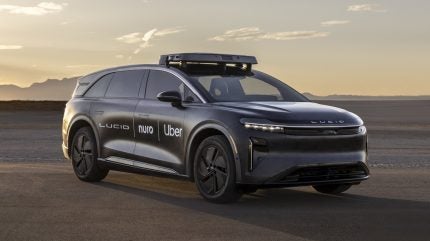
Uber Technologies has partnered with Lucid and Nuro for a “next-generation premium global robotaxi programme”, which is set to launch robotaxi service later next year in a major US city.
The service will combine Lucid Gravity’s software-defined vehicle architecture, Nuro Driver- Nuro’s Level 4 self-driving system, and the global network of Uber to provide a fully integrated robotaxi experience.

Discover B2B Marketing That Performs
Combine business intelligence and editorial excellence to reach engaged professionals across 36 leading media platforms.
Uber aims to acquire and deploy 20,000 or above Nuro Driver-equipped Lucid vehicles over a six-year period starting 2026 with a significant investment.
Uber or its third-party fleet partners will own and operate these vehicles and make them available exclusively via the Uber platform. The inaugural Lucid-Nuro robotaxi prototype is already in operation at Nuro’s proving grounds in Las Vegas.
Lucid Interim CEO Marc Winterhoff said: “This investment from Uber further validates Lucid’s fully redundant zonal architecture and highly capable platform as ideal for autonomous vehicles, and our industry-leading range and spacious well-appointed interiors, as ideal for ridesharing.
“This is the start of our path to extend our innovation and technology leadership into this multi-trillion-dollar market.”
The Lucid Gravity’s advanced technology and long range make it an ideal candidate for a scalable robotaxi service, while the Nuro Driver’s AI-powered software and automotive-grade hardware offer reliability and cost-efficiency at scale, according to the companies.
Nuro is said to spearhead the development and validation of the robotaxi’s safety case, ensuring safe operation through simulations, testing, and supervised on-road trials.
Recently, Lucid Group announced a significant update to its DreamDrive Pro suite of advanced driver assistance systems (ADAS), launching Hands-Free Drive Assist and Hands-Free Lane Change Assist1 to its EV lineup.
Also, Uber, in partnership with Baidu, announced that they will deploy several Baidu’s Apollo Go autonomous vehicles on its platform in markets outside mainland China and the US.






